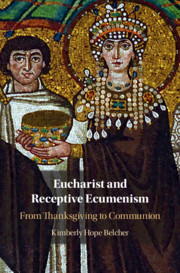Book contents
- Eucharist and Receptive Ecumenism
- Eucharist and Receptive Ecumenism
- Copyright page
- Contents
- Tables
- Preface
- Acknowledgments
- 1 The Call of Unity
- 2 Diversity Is the Tradition
- 3 A Phenomenology of Giving Thanks
- 4 Eucharistia and Revelation
- 5 Ambrose’s Words and the Roman Canon
- 6 Augustine and the Assembly’s Destiny
- 7 Consecrating and Offering the Ordinary
- 8 The Eschatological Exception
- 9 Outdo One Another in Showing Honor
- 10 Into the Heart of God
- Bibliography
- Index
4 - Eucharistia and Revelation
Published online by Cambridge University Press: 16 October 2020
- Eucharist and Receptive Ecumenism
- Eucharist and Receptive Ecumenism
- Copyright page
- Contents
- Tables
- Preface
- Acknowledgments
- 1 The Call of Unity
- 2 Diversity Is the Tradition
- 3 A Phenomenology of Giving Thanks
- 4 Eucharistia and Revelation
- 5 Ambrose’s Words and the Roman Canon
- 6 Augustine and the Assembly’s Destiny
- 7 Consecrating and Offering the Ordinary
- 8 The Eschatological Exception
- 9 Outdo One Another in Showing Honor
- 10 Into the Heart of God
- Bibliography
- Index
Summary
The conversion of the purely cognitive apprehension of “God” into an ardently desired target for praise and confession is liturgy. Properly speaking, this is not solely an apophatic move; it is the change of an intellectual object into a relational other. Only an erotic reduction can allow space for a gift to be attributed to God without God becoming an idol.1 The gift given – all the given gifts – is returned to givenness, manifesting givenness by means of a desire to seek an origin. Since the origin can never be reached, the giver may be named only erotically, as the target of a gift of thanks that may not reach its target.2 The erotic aspect of the liturgy is tied not only to the eucharistic prayer, or to word and sacrament, or to meal and sacrifice, but also to the variances and periodic recollection of the Eucharist over the course of the liturgical year and the life cycle.3 The Eucharist, then, needs to be considered as a thanksgiving relating to three things: the self (especially as considered vis-à-vis the other), the covenant community, and the whole cosmos.
- Type
- Chapter
- Information
- Eucharist and Receptive EcumenismFrom Thanksgiving to Communion, pp. 80 - 96Publisher: Cambridge University PressPrint publication year: 2020



